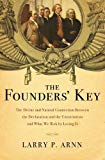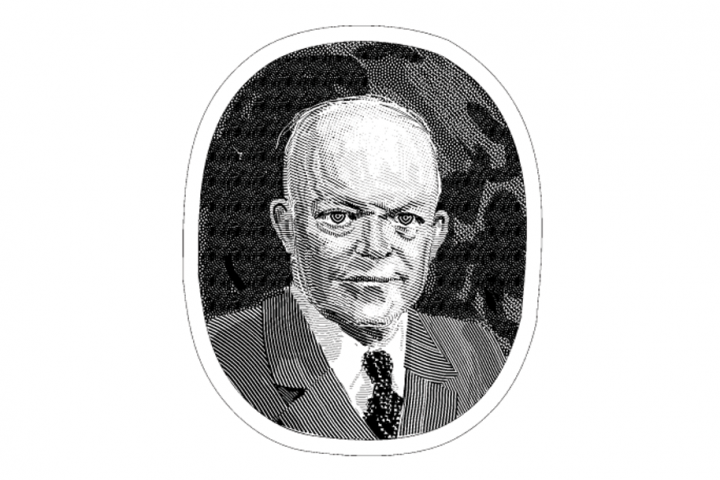Books Reviewed
A review of The Founders' Key: The Divine and Natural Connection Between the Declaration and the Constitution and What We Risk by Losing It , by Larry P. Arnn
, by Larry P. Arnn
In 1766, King George III, ruler of an empire that stretched across the globe, wrote an earnest letter to his son. Allowing that he might lack "superior abilities," the monarch expressed the hope that "all unprejudiced persons will be convinced that whenever I have failed it has been from the head, not the heart." He meant well, in other words.
His good intentions and humility did not matter a decade later, however, when his American colonies rebelled. The proximate cause of the rupture was the burdensome duties and taxes the king and his ministers had imposed on them. But the revolt was about more than economics. What incensed the members of the Second Continental Congress was that his majesty's government ruled without the Americans' consent, and had ordered soldiers and mercenaries to the continent to enforce its arbitrary decrees.
The king's abuses, the Congress said, had left the colonists no choice other than to exercise their natural right of revolution. They would, accordingly, take up arms to assume the "separate and equal station to which the Laws of Nature and of Nature's God" entitled them.
That was the message of the Declaration of Independence. Larry P. Arnn, president of Hillsdale College, argues in The Founders' Key that the Declaration cannot be understood in isolation. The Continental Congress not only proclaimed the rights of man, but also conveyed the essential attributes of the government necessary to secure those rights.
* * *
After concluding the Revolutionary War in 1783, Americans spent several years struggling to apply the Declaration's teaching. The Articles of Confederation, which all 13 states ratified by 1781, were insufficient for the task: factions started fights between the states and fomented uprisings within them, threatening to tear the Union apart.
The Constitution of the United States was the means to achieve the Declaration's end of equal protection of rights. The founders saw no disconnect between the argument of the Declaration and the forms of the Constitution. Such a division, Arnn says, was imposed a century later by Darwinists, Hegelians, and early Progressive theorists. He subtly dismantles the argument that the Declaration and Constitution are different texts designed for different purposes. Quite the contrary: The Declaration and Constitution are in accord.
James Madison thought so. Before he became the principal author of the Constitution, the Virginia lawyer and ally of Jefferson sat on the committee that drafted the Virginia Declaration of Rights adopted in June 1776. That declaration stated:
That all men are by nature equally free and independent, and have certain inherent rights, of which, when they enter into a state of society, they cannot, by any compact, deprive or divest their posterity, namely, the enjoyment of life and liberty, with the means of acquiring and possessing property, and pursuing and obtaining happiness and safety.
Nor was it only Madison and Jefferson who thought alike. John Adams led the committee that wrote the Massachusetts Constitution of 1780. Its preamble closely resembles the Virginia declaration and the Declaration of Independence:
All men are born free and equal, and have certain natural, essential, and unalienable rights; among which may be reckoned the right of enjoying and defending their lives and liberties; that of acquiring, possessing, and protecting property; in fine, that of seeking and obtaining their safety and happiness.
The founders grasped the symmetry in a political philosophy of natural rights and a constitutional government. Nothing less than a limited, representative government with separated powers is worthy of the consent of free men. Study the Declaration's specific list of charges against King George closely, Arnn writes, and the outlines of the Constitution become visible. "When the Declaration demands laws ‘wholesome and necessary for the public good,' it raises the question what kinds of laws those are." Then, by implication, it answers that question.
Arnn classifies the Declaration's charges against George III into three categories: representation and consent, limited government, and the separation of powers. The king acted without considering the interests of Americans, the founders alleged. He interfered in their lives by imposing taxes and quartering troops, and assumed without warrant the legislative, executive, and judicial functions of government. Such an autonomous, unlimited, unitary government is despotic. Not only does it not protect rights equally; it protects no rights at all. Explains Arnn:
The protection of rights requires a government that is representative of the governed, its powers separated among branches, its scope and size limited to be consistent with a liberal and free society. Only such a society can be sufficiently independent of the government to hold the sovereignty upon which government is based.
* * *
But what sort of rights is he talking about? An observer of contemporary American politics would assume that we have rights to just about everything—not only to those freedoms mentioned specifically in the Declaration, but also to an abortion, to marry a member of the same sex, and to food, housing, health insurance, transportation, and all the other accoutrements of a full and "equal" life. When most Americans talk about rights today, they are following the lead of our 32nd president, who told the Commonwealth Club in September 1932, "The task of statesmanship has always been the redefinition of these rights in terms of a changing and growing social order."
For the men who wrote the Declaration and Constitution, however, the rights we possess are antecedent to society. Our right to property begins with our bodily selves. We exist, and therefore have a right to life. We speak, and therefore have a right to speech. We think, and therefore have a right to conscience. We have hands that can work, and therefore have a right to the fruit of that labor.
Government does not redefine rights as history runs its course. The teaching of the Declaration and the Constitution is that human beings institute government to protect the rights they already possess by virtue of being. We do not have rights to goods that exist only in society, such as health insurance, college loans, and pensions, since the provision and redistribution of these material benefits can take place only after government is established, and would require the government to infringe on our natural, pre-social, corporal rights.
Securing the people's inherent rights means, above all, protecting them against faction. "It becomes a political problem when a person or a group of people pursue his or their passions or interests at the expense of the rights of other people or of the minority," Arnn writes. A faction may be limited to a single individual such as George III. Or a faction can be several people organized around a single purpose—creditors, say, or debtors. But the most problematic faction of all may be an impassioned majority. "It becomes the most severe political problem when the people animated by [private interests or agendas] constitute a majority because in a republican government the majority speaks for the nation, and it may do what it pleases."
The founders' key insight was that an extended federal republic provides the best protection against an impassioned faction. Men with political ambition must cool their passions to woo many people at once. "Speech, to be effective across a large area and to a large number of people, must be fairer and truer than among a cabal." There are so many interests that one faction is less likely to dominate all the rest.
Local, state, and federal governments, as well as the departments within them, check and balance each other. "The different governments will control each other at the same time that each will be controlled by itself," Publius wrote in Federalist 51. The simple constitutional architecture of federalism and separation of powers in a vast republic would produce laws in harmony with natural rights and beneficial to the happiness of the people, while giving statesmen the flexibility to legislate, execute, and adjudicate the law with prudence and common sense.
At least that was the plan. Over time, as elite understandings of equality and rights drifted farther and farther from the founders' moorings, American government was fundamentally transformed, the connection between the Declaration and the Constitution attenuated. The purpose of government was no longer to protect natural rights equally; it was to redistribute property and income in the service of material equality. An endless array of bureaucracies—the administrative state—grew on the surface of constitutional government. The forms of the Constitution, and their relation to the principles of the Declaration, became an afterthought, even a joke. In 2009, when a reporter asked Nancy Pelosi what provision of the Constitution authorized the passage of Obamacare, she famously asked, "Are you serious?"
The very idea of law has been deformed. The Northwest Ordinance is under 3,000 words. The Homestead Act is under 1,400 words. The Declaration and the Constitution are just as pithy. Today's laws are thousands of pages in length. They are delegations of congressional authority to unelected agencies that issue regulations unaccountably and most often in the interests of a particular faction. Law in America today embodies James Madison's fear: "It will be of little avail to the people, that the laws are made by men of their own choice, if the laws be so voluminous that they cannot be read, or so incoherent that they cannot be understood; if they be repealed or revised before they are promulgated, or undergo such incessant changes that no man, who knows what the law is to-day, can guess what it will be to-morrow." This republican dystopia is the ideal modern liberalism exists to realize, and to which Obama Democrats want us to race.
* * *
In one particularly beautiful passage Arnn likens the Constitution to a work of sculpture. The material is the American people, the founders are the artists, and the natural equality of man was the ideal in their minds as they worked. The shape the work assumed is the organic law of the Constitution. Today, lamentably, the founders' masterpiece is treated as a historical artifact, fit for a museum, worthy of appreciation and flattery but not to be taken seriously or considered relevant.
The politicians and bureaucrats who govern America in the 21st century, like King George III in the 18th, may have their hearts in the right place, but their heads woefully misunderstand the idea of rights and constitutional government. The Founder's Key is a primer for everyone interested in the doctrine of natural right and the constitutionalism that doctrine implies. Americans who read these succinct pages and spend time studying the appendices, which include the Declaration, the Constitution, crucial parts of The Federalist, and James Madison's essay "Property," will be much closer to understanding the founders' vision. They will understand that America's future depends on the rediscovery of its philosophical beginnings.




